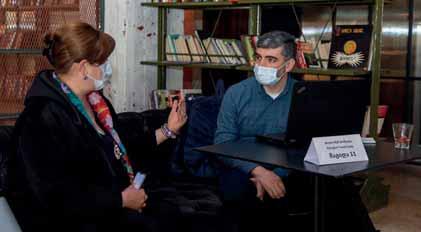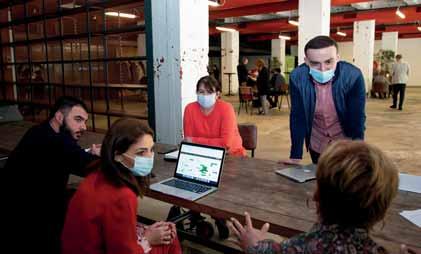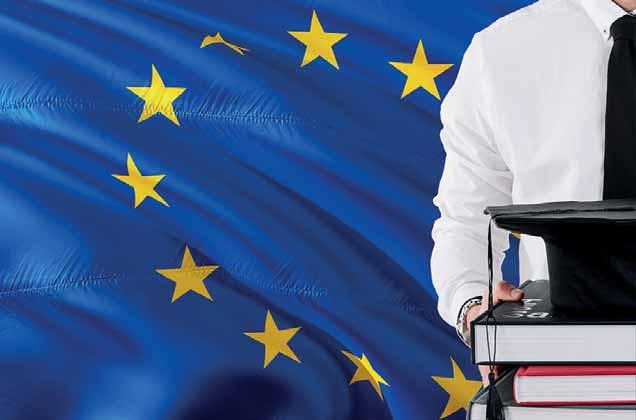
9 minute read
Industry
from Issue #1290
CENN with EU & USAID Supports Professional and Economic Growth of the Georgian Hospitality Industry
BY ANA DUMBADZE
Advertisement
On March 29-30, CENN, with the support of the EU and the USAID, organized a series of Match-Making & B2B events for local businesses in tourism in order to support their growth and digital development. As tourism businesses around the world look to a greener future and highly developed digital services, the event was a crucial steping stone towards the revival of the hospitality industry in Georgia.
The event was organized as part of the collaboration between two cross-cutting projects: ‘Embrace Tsalka’ and ‘Digital Caucasus,’ both of which aim to promote and strengthen the local tourism sector.
SLOW, GREENER, AND MORE SUSTAINABLE TOURISM
As the pandemic brought travel and tourism to a halt, many businesses see this as an opportunity to introduce slower, greener and a more sustainable approach to tourism. Tourism businesses have to make major adjustments and develop sophisticated digital services to meet the needs of their guests to make them feel safe while discovering the tourism attractions of a foreign country.
The event was a chance to discuss new opportunities for local businesses, provide guidance in digital development, and exchange advice on new innovations.
The two-day event jointly organized by CENN, the EU-funded ENPARD agricultural program, and USAID Bureau for Europe and Eurasia, Economic Development, Governance and Enterprise Growth project, was held at Stamba Hotel Tbilisi, where the benefi ciaries of the ‘Embrace Tsalka’ and ‘Digital Caucasus’ projects had an opportunity to get acquainted with the experience of successful companies, listen to the opinions and views of highly experienced entrepreneurs, and launch new collaborations for better performance in the future through B2B meetings.
The fi rst day of the event saw an indepth training organized for entrepreneurs working in the tourism sector, including local businesses from Tsalka,; as part of the event, invited experts instructed the entrepreneurs on the proper use of digital technologies and development of eco and gastro tourism, with practical exercises.
The next day of the event served to allow participants to put the acquired knowledge into practice.
Distinguished and leading experts involved in the tourism sector participated in the event, including representatives of associations and private companies, among them the Georgian National Tourism Administration, Enterprise Georgia, Gastronomic Association, Ecotourism Association, Association ‘Georgian Wine,’ Geo Trend, Georgian Travel Guide, Georgian Travel Guide, Community Sheen Folks, and Company Solvit, who introduced successful examples and innovations to the attendees, and shared their experience and opinions regarding the present and future of the hospitality industry, with ecotourism product development and digital technologies in the tourism sector as the main topics. They emphasized the need for ecotourism development in the country, and the crucial role of CENN and other environmental organizations in this process. Among the invited speakers were representatives of digital technology projects which serve the digitalization of tourism.
“While implementing different economic and tourism development projects at CENN, we work on building the capacity of our benefi ciaries in order to improve their skills in different directions to keep them competitive on the global market,” said Nana Janashia, Executive Director of CENN. “It is important that local businesses keep up with modern trends, and this B2B Match-Making event served the same mission and aimed to open them to some professional partnership opportunities to help them develop high standards in their small and medium-size businesses. We believe we must work together more to become greener and more digital for better economic growth and a competitive and inclusive future.”
THE EMBRACE TSALKA PROJECT
The EU-funded ENPARD agricultural program has been implemented in Georgia since 2013. It aims to support farmers and entrepreneurs in targeted regions to address issues of education and technology. CENN, together with partner organizations the Georgian Farmers Association (GFA) and Rural Development Research Institute (Ifl s), implements ENPARD in the Tsalka Municipality for the EU-funded project ‘Local LEADERs Embrace Sustainable Development in Multi-Ethnic Tsalka Municipality (EMBRACE Tsalka)’. The project benefi ciaries are funded as part of the grant projects, while CENN supports the development of their business potential, which itself refl ects on the economic development and diversifi cation of Tsalka Municipality, which is one of the main goals of the project.
This project is especially important for young people living in the region, as the goal of the project is directly related to discovering and promoting the entrepreneurial potential among them. The project contributes to the reduction of rural poverty in Tsalka Municipality, known for its diverse population. It addresses economic, social, and environmental concerns by improving agricultural competitiveness, promoting the sustainable management of natural resources, and building climateresilient rural economies and communities. Furthermore, the mentioned project helps locals to improve and deepen their skills in the hospitality industry, acquire new opportunities, and contribute to the economic development of the region by making it more attractive for tourists.
“The projects implemented under ENPARD, including the one being implemented in Tsalka, are carried out with the ‘Leader’ approach which in principle means bottom-up approach. The rationale behind this is that no one knows the challenges existing in Tsalka better than locals themselves,” Melano Tkabladze, CENN, ‘Embrace Tsalka’ Project Manager, told us. “Accordingly, a local action group (LAG) was established, which is a kind of a ‘locomotive’ of processes ongoing in the region, working for its better development. The LAG then developed a local development strategy document, which is focused on the needs of Tsalka, and also contributes to implementation of national strategies. With this document, seven main priority directions have been highlighted, including the untapped potential of Tsalka in the tourism sector. Tsalka municipality in the Kvemo Kartli region is a unique place considering its multiethnic composition. The coexistence of many ethnic groups supports the development of ethno tourism, not to mention fascinating potential in eco and agro tourism.
“These are not empty words: it has been studied and proven, there is a bilingual travel guide ‘Embrace Tsalka’ available online on the Tsalka website: tsalkalag. ge, which refl ects the tourist attractions of the region well, and those interested can look through it,” she noted.
THE DIGITAL CAUCASUS PROJECT
The Digital Caucasus project, which is also being implemented by CENN via a grant awarded by the USAID Bureau for Europe and Eurasia, Economic Development, Governance and Enterprise Growth project, works to support the growth of SMEs involved in the sustainable tourism value chain. The pandemic has shown tourism businesses the importance of digitizing services and management mechanisms, and introducing information and communication technologies into their operations. The modern tourism market is characterized by competitiveness, including in terms of technological innovation. The main purpose of the project is to help the benefi ciary companies in this, to create favorable conditions for them to better master and use innovative management platforms in their business to better develop their operations and ultimately to reap more economic benefi ts.
The project targets selected regions in Georgia, Armenia and Azerbaijan, and focuses on SMEs that are local service providers of ecotourism, rural tourism and adventure tourism, business associations and DMOs, as well as rural households involved in eco and rural touristic services. In addition, the project creates strategic partnerships with regional and local authorities in the target areas and national administrations active in the fi elds of tourism, protected areas and forestry.

THE BENEFITS OF BUSINESS MATCHMAKING
GEORGIA TODAY spoke to several participants to fi nd out more details about the importance of such cooperative meetings as that held this week, and about the future development prospects of local tourism, which itself represents a central pillar for the Georgian economy.
“The event will be useful for Tsalka benefi ciaries to acquire new skills and put them to use in practice, fi nd new collaboration prospects, speak face to face with future partners, etc.,” Tkabladze said. “Moreover, it will also be useful for those who plan to get involved in tourist activities in Tsalka, in order to be made aware of its tourism potential. This is not only a training;: we’ve found and revealed the needs of tourism sector representatives and small businesses in the region and then tailored this event to their needs to be as practical and useful as possible.”
“Such cooperative meetings have an important role in the development and popularization of small and medium businesses,” said Nato Robitashvili, representative of the Georgian Ecotourism Association. “At today’s event, business representatives contributing to the economic development of the region, are present, and the experience and knowledge gathered as part of these trainings and meetings will positively affect their activities in the near future. Further, such events allow tourism businesses to connect with tour operators and acquire more partners and connections. Ecotourism is one of the main directions nowadays, especially against the background of the global pandemic. Now, the emphasis should be made on offering maximally “healthy” and safe tourist services to travelers. Georgia has big potential in terms of ecotourism, and the role of CENN and the projects ‘Embrace Tsalka’ and ‘Digital Caucasus,’ implemented by it and partner organizations, are of utmost importance in this process. Our Association and its numerous members will continue to fi rmly support and be actively involved in ecotourism development in the country.”
During the event, Tamar Kakhidze, representative of the Tourism Product and Small Infrastructure Development Department of the Georgian National Tourism Administration (GNTA), spoke about the current trends, challenges and requirements in the tourism industry. During her presentation, she highlighted the latest international trends of post-COVID travel, such as safety of tourists and sanitary norms, increasing demand for domestic tourist groups, and demand for adventure, eco, and agro tourism activities. She discussed the restoration of safe tourism in Georgia, the role and activities carried out by the Georgian National Tourism Administration in this process, and the importance of the involvement of private sector representatives. She further emphasized that promoting the private sector in quality improvement and target marketing activities are essential at this stage. The GNTA representative expressed readiness to collaborate and share experience with project benefi ciaries on important issues for local tourism development.
“The demand for eco, agro and adventure as well as wellness tourism is increas-
ing,” said Tamar Kakhidze. “Georgia offers various tourism products of these types, though the country possesses great potential to further diversity and develop these offers. Tourism is a strategic priority for the country in anti-crisis and economy recovery plans. So, to reduce the negative impact of the COVID pandemic, tourism businesses are supported with various initiatives from day one of the crisis, including economic stimulus packages, training courses, policy documents and guidelines, marketing activities and also small grant programs with the involvement of the donor organizations.”
Within the framework of the event, tourism business representatives with similar interests and carrying out similar activities, had the chance to meet face to face and discuss essential issues such as the development and management of tourism business, management of food establishments, collaboration with travel agencies and sales, and so on. B2B meetings for winemakers were also held, allowing participants to fi nd common interests and draw future collaboration prospects.
At the end of the event, an info tour for accommodation and food facilities was also held for project benefi ciaries at ROOMS Hotel, which also provided an important, practical experience for them in their daily activities.






